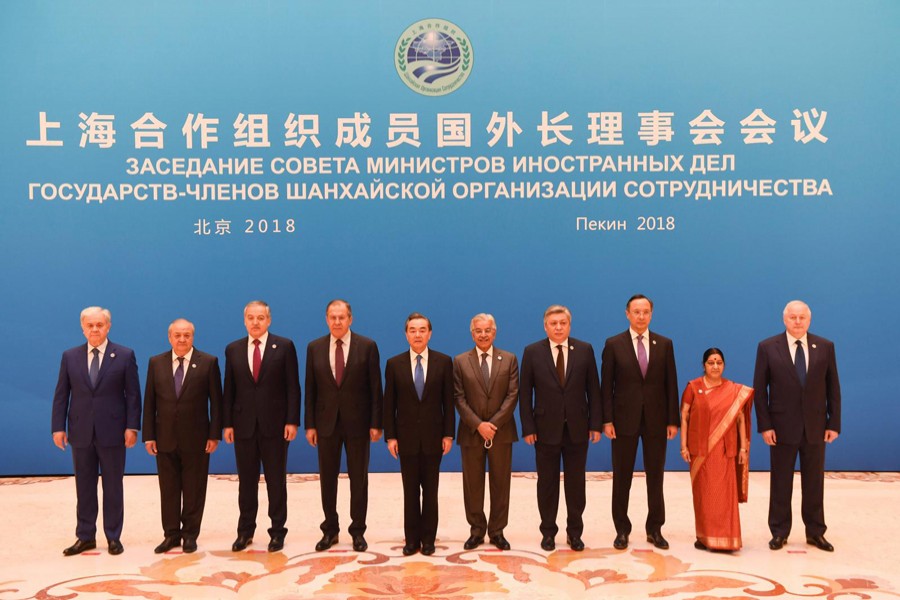China failed to get India's support for its ambitious Belt and Road infrastructure project at the end of a foreign ministers' meeting of a major security bloc on Tuesday, ahead of an ice-breaking trip to China this week by India's prime minister, reports Reuters.
The Belt and Road is Chinese President Xi Jinping's landmark scheme to build infrastructure to connect China to the rest of Asia and beyond, a giant reworking of its old Silk Road.
India has not signed up to the initiative as parts of one key project, the $57 billion China-Pakistan Economic Corridor, runs through Pakistan-administered Kashmir that India considers its own territory.
Whether or not China will be able to bring India round to Belt and Road will likely be a key measure of the success of Indian Prime Minister Narendra Modi's trip to China to meet Xi for an informal meeting on Friday and Saturday.
But India's foreign minister did not express support for Belt and Road in the communique released after foreign ministers of the China and Russia-led Shanghai Cooperation Organisation met in Beijing.
India, along with Pakistan, joined the group last year.
All the other foreign ministers - from Kazakhstan, Kyrgyzstan, Pakistan, Russia, Tajikistan and Uzbekistan - "reaffirmed support for China's Belt and Road proposal", the statement read.
It gave no further explanation.
The communique otherwise was a broad expression of unity by the ministers on issues ranging from their support for the Iran nuclear deal to the need to combat the spread of extremism.
Modi is coming to China as efforts at rapprochement gather pace following a difficult year in ties between the two neighbors.
The Asian giants were locked in a 73-day military stand-off in a remote, high-altitude stretch of their Himalayan border last year. At one point, soldiers from the two sides threw stones and punches.
The confrontation between the nuclear-armed powers underscored Indian alarm at China's expanding security and economic links in South Asia.
In comments carried on the foreign ministry's website, Chinese Vice Foreign Minister Kong Xuanyou said holding the meeting in an informal way meant the two leaders could have a deep exchange of views in a relaxed, friendly atmosphere to promote cooperation.
"This not only will benefit the two countries and two peoples, but will also have an important effect on peaceful development in the region and around the world," the ministry paraphrased Kong as telling Indian media in Beijing.
Modi will visit China in June for a summit of the Shanghai Cooperation Organisation.
China will also have to tread carefully to avoid giving its close ally Pakistan cause for alarm. China on Monday reassured Pakistan that relations between the two countries were as firm as ever and would "never rust".
Another report from Singapore adds: Southeast Asian leaders will focus on trade wars, the crisis in Myanmar and security tensions in the disputed South China Sea at a summit this weekend, but it's highly unlikely there will be any headline-grabbing progress on the issues.
The Association of Southeast Asian Nations (ASEAN), formed more than half a century ago, has historically struggled with challenges facing the region because it works only by consensus and is reluctant to get involved in any matter deemed to be internal to any of its members.
The summit is being hosted by Singapore, an island state of 5.6 million people that is the smallest in the 10-member bloc, but the wealthiest and most westernized. The group also includes developing countries like Myanmar, Laos and Cambodia, as well as nations like the Philippines, Thailand, Indonesia, Malaysia, Brunei and Vietnam.
Asked why ASEAN took so long to take action on regional challenges, Singapore Foreign Minister Vivian Balakrishnan said: "We can only do something if we get consensus. We need to do that because no other regional grouping has such diversity.
"But when ASEAN does decide and it does get moving, because there is consensus, I think we can do so effectively," he said in an interview.
Singapore's largest-selling newspaper, the Straits Times, said last year that even ASEAN's five founding members took distinct approaches to issues facing the grouping.
The Philippines, it said, "demands 'a legal basis' for everything, while Singapore tends to ask 'What is in it for us?'"


